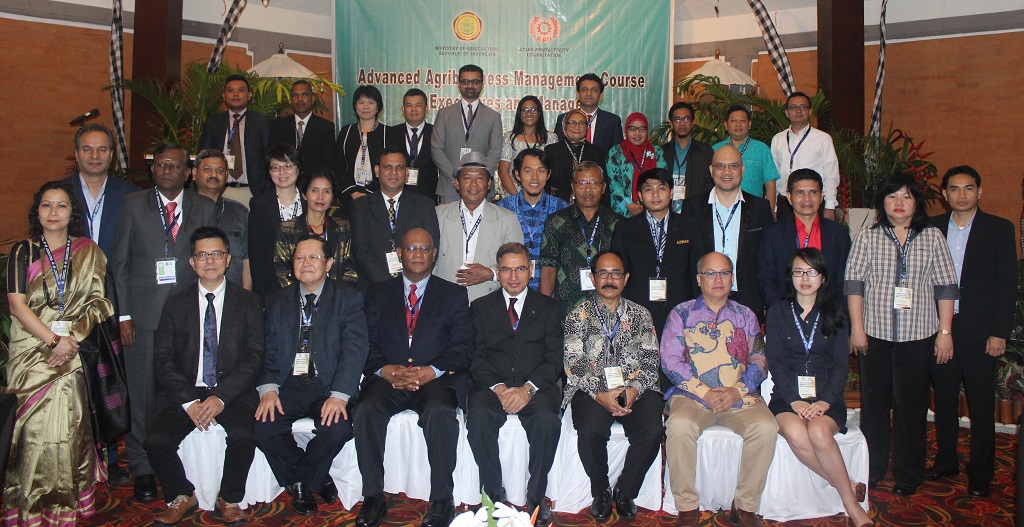
Select Page
The Asian Productivity Organization (APO) concluded its Advanced Agribusiness Management Course for Executives and Managers in Bali, 5–9 March 2018. The collaborative program with Cornell University’s Dyson School of Applied Economics and Management was conducted with support from Indonesia’s Bureau for International Cooperation (Ministry of Agriculture) and the Directorate General of Training and Productivity (Ministry of Manpower).
The five-day course aimed at creating awareness of innovative marketing strategies and applications of modern technologies in agriculture, as well as the key roles of enablers like national policies and programs, among government officers, senior representatives of SME associations, academics, and consultants in charge of analyzing the agribusiness and food industry. Experts and participants shared successful models and best practices in agribusiness management for agribusiness startups and SMEs.
Food and agribusiness have huge economic, social, and environmental impacts. Although substantial productivity improvements have resulted in abundant food supplies in many parts of the world over the past five decades, feeding the expanding global population has reemerged as a critical issue, with calorie demand expected to increase by 70% by 2050. During the course, participants examined how food security, productivity, sustainability, and competitiveness could be enhanced in APO member countries despite increasing regional and global agribusiness competition.
During the inaugural session, Director Mesah Tarigan of the Bureau of International Cooperation, Ministry of Agriculture, said that to achieve sustainable self-sufficiency in key staples for over 265 million Indonesians, the government had been undertaking a special program based on a modern, innovative, holistic approach to ensure a healthy environment for the growth of the agriculture sector in the country. “In terms of prevailing policies, we have succeeded in reviewing and revising those policies that are counterproductive or have the potential to slow down program execution. This includes revision of procurement systems, from manual to electronic bidding,” he reported.
Stating that the heart of agriculture had always been farmers, Tarigan described how the government had been driving improvement in the value management of agricultural supply chains. “The shortening of this once long chain has generated value, made our products more competitive, and consequently improved farmers’ profitability and overall welfare,” he added.
Delivering the keynote address at the welcome reception, Secretary-General Hari Priyono of the Ministry of Agriculture thanked the APO for providing the opportunity to host the project in the country. Noting that more than 200 officials from the Ministry of Agriculture and agencies under it had benefited from APO programs, he believed that the organization continued to play a key role in the development of human resources and contribute to the development of agriculture in the region, including Indonesia.
Professor Dr. Ralph D. Christy, Director of the Emerging Markets Program, Cornell University, gave welcome remarks and pointed out that innovative marketing strategies and a supportive enabling environment could enhance the performance of food-industry SMEs and accelerate their contributions to sustaining economic growth and development.
In welcoming delegates to the course, APO Secretariat Agriculture Department Director Dr. Muhammad Saeed commented that opportunities in agribusiness had been expanding substantially with the globalization of trade and rising incomes in the Asia-Pacific region and that recent developments including rapidly increasing populations, had led to greater interest in the sector. “It is also opening up numerous opportunities as well as challenges,” he remarked, adding that the efforts to expand agribusiness operations “must deal with emerging agriclimatic challenges including the progressive decimation of arable land and shrinking water availability for agriculture due to conversion to residential, industrial, and other nonagricultural uses.”
“The challenges to the sector are further exacerbated by the aging of the farming population and migration of the young labor force to urban areas. In many rural communities in Asia, the farming landscape is changing, with more women and the elderly working on farms. The rapid rate of urbanization of many countries poses other challenges for the sector,” Dr. Saeed stated. “How can we still feed the 10 billion people in 2050 without overwhelming our planet? We have to explore new options early. One area in which the APO can take the lead is to facilitate the development of future food. This will be a key focus area for agriculture programs,” he concluded.
This was the sixth in the series of advanced agribusiness management courses specifically for executives and managers offered jointly by Cornell University and the APO. It was attended by 28 participants from 11 APO member countries, one overseas observer from Malaysia, and 45 local observers.
